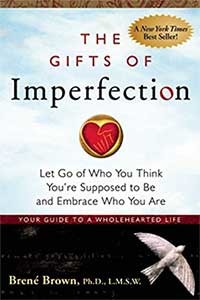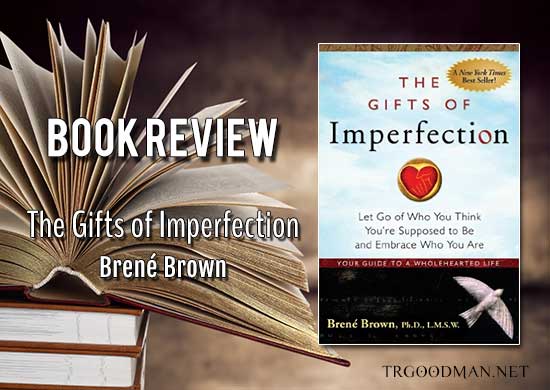Book Review: The Gifts of Imperfection by Brené Brown
 If you’ve been following me on Goodreads this year (or stalking; don’t think I can’t see you hiding behind that squirrel), you have probably noticed that I’ve been reading a lot of self-help and life-improvement books this year. Part of that is due to a renewed effort to help myself (see what I did there?) improve my life (I did it again! +25 XP), break out of a decades-long depression, and just in general makes things better for myself and the people who
If you’ve been following me on Goodreads this year (or stalking; don’t think I can’t see you hiding behind that squirrel), you have probably noticed that I’ve been reading a lot of self-help and life-improvement books this year. Part of that is due to a renewed effort to help myself (see what I did there?) improve my life (I did it again! +25 XP), break out of a decades-long depression, and just in general makes things better for myself and the people who put up with love me.
To some extent, despite a constant string of disasters and setbacks, I have done that. The latest book from which I sought to extract knowledge by means of dental pliers learn is The Gifts of Imperfection by Brene Brown. The idea is to learn to accept yourself for who you are, faults and all, and show that same compassion to those around you. So, did it work, or did these Gifts of Imperfection turn out to be full of so much coal with much nicer, more personable hair than I’ll ever have?
Here we go.
There Is Still Hope
Why do you linger here here when there is no hope?
There is still hope.
When you struggle with the constant threat of self-shame and the depression that follows it around like an evil little puppy, it can be hard to remember that things can, and probably will, get better. One of the points made over and over is that perfectionism, along with much of the negativity we direct at ourselves and others, is the result of shame, and that shame’s kyptonite is compassion.
This gives you a weapon that you can deploy (or have Green Arrow shoot, if you have Justice League connections) when the shame kraken rises up out of the sea and tries to eat the Andromeda of your happiness.
No, that didn’t make any sense to me, either, although Andromeda of Happiness would be a great name for a Jefferson Starship cover band.
Basically, the idea is that you’re going to screw up, I’m going to screw up, and that’s okay. Forgiveness all around, and then we get on with our day. Things can’t suck forever. Just learn from your mistakes and try to not be a jerk.
A Roadmap to Compassion
The Gifts of Imperfection is divided up into what Brown refers to as guideposts. Each one is focused on a particular aspect of perfectionism. Think of them as minions of the shame kraken. Each one attacks you from a different angle in order to break down your self-esteem and make you put up all sorts of barriers that prevent you from seeing things objectively.
I thought that breaking things down this way made it easier to isolate and identify each of those little minions and attack them one at a time, rather than going after the shame kraken and its army all at once. Everyone stacks up differently when faced with those aspects of imperfection (which totally sounds like an Enigma album name). One person may be particularly weak against the fear of scarcity, while another might have a problem where they constantly compare themselves to others.
And if you have to face a Charmander, I recommend using Squirtle. Water Gun is super effective!
A Little to the Left
While I did learn a few things from this book and feel that, overall, I am better off for having read it, I couldn’t help shaking the feeling that I am not the target demographic. Most of the stories, anecdotes, and advice cover people and situations more in line with mothers, many of them single, and almost all of them of a strong financial background. As I have not (to my knowledge, at least) given birth to a baby human or become financially independent from my workplace, I felt a little left out.
This is not a mark against the book or anyone more suited to its material. It just would have been nice for it to be more inclusive for people in differing situations or less affluent monetary conditions.
I still want a Scrooge McDuck money bin. Ah well; maybe next year.
I’ll Have One With Everyone
As someone who has flirted with Buddhism (but never closed the deal; I’m not easy, you know), I couldn’t help but notice quite a few similarities between Buddhist teachings and many of the recommendations on the book. The central theme revolves around letting go of the fixations and obsessions that make you unhappy and color your perspective with excrement-colored glasses.
That’s some old-school sutra right there.
Spirituality is a fairly constant theme throughout the book, but it doesn’t seem to point the reader toward any particular faith. Maybe the idea is that happiness depends on having some sort of connection with something larger and more powerful than yourself, whether it’s God, Jesus, the universe, or Andre the Giant.
Have fun storming the castle.
So, the book. Definitely some good lessons, though many people may find themselves on the other side of the shop window, looking in and trying to gleam whatever knowledge they can from how the other half lives. The focus on spirituality may come across as new-age-ey, but I can understand why it was included. Like any self-help book, you’re free to take what you find helpful and ignore the rest.
Overall, I would have to say that while there are some good lessons to be had, the book isn’t perfect, and that’s okay. I forgive.



Bad “Lord of the Rings” reference. No Evenstar for you!
But seriously, you’re not easy? Since when? ;P
Sounds like someone needs a Tom Bombadil quote…